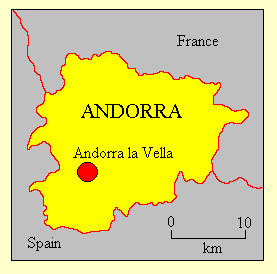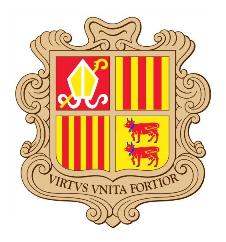

PRINCIPALITY OF ANDORRA
• Official name: Principat d'Andorra (Pricipality of Andorra)
• Location: Western Europe
• International organisations: The Council of Europe, The Organisation for Security and Co-operation
in Europe, The United Nations
• Borders: France, Spain
• Coastline: None
• Land area: 468 Km2
• Population: 69,000. Only half the population are Andorran citizens, the rest being immigrants from other European countries or Africa.
• Annual GDP (PPP) per capita: US$44,900 (2009 CIA estimate). World ranking: 9.
• Ethnicity: Most of the population identify as "Andorran." The Andorrans are mostly
Catalan or Spanish by descent.
• Languages: Catalan is the official language and is generally used. Castillian Spanish and
French are widely understood.
• Religion: Most of the population are Catholic Christians, although there is a growing Muslim immigrant minority.
• Form of government: Constitutional co-principality and parliamentary democracy.
Andorra consists of seven parishes.
• Capital: Andorra la Vella
• Constitution: The Constitution of Andorra came into effect on
4 May 1993.
• Heads of state: The Co-Princes of Andorra, who by ancient custom are the President of France (President
Nicolas Sarkozy, who took office on 16 May 2007) and the Bishop of Urgel in Spain
(Monseigneur Joan Enric Vives Sicilia, who took office on 12 May 2003). They are
represented in Andorra by Christian Fremont and
Nemesi Marques Oste respectively.
• Head of government: The Prime Minister, appointed by the representatives of the
Co-Princes. The Prime Minister is the leader of the largest party in the legislature and
is accountable to it.
• Legislature: The General Council
(Consell General) is a unicameral legislature, which has 28 members elected for
four-year terms. Of these, 14 are elected from two-member constituencies corresponding to
the seven parishes and 14 are elected by proportional representation.

• Electoral authority: The Elections Department of
the Andorra Government conducts national elections.
• Freedom House 2011 rating: Political Rights 1, Civil Liberties 1
• Transparency International Corruption Index: no rating given
• Reporters Without Borders Press Freedom 2010 Index: no rating given
• Heritage Foundation Economic Freedom 2010 Index: no rating given
Political history
Andorra claims to have been founded by Charlemagne, but its independence dates definitely
from 1278. It was a feudal principality ruled by local landowners in the name of the
nominal Co-Princes, the Count of Foix and the Bishop of Urgel. In later times the rights
of the Count of Foix passed to the King of France and then to the French Republic. The
Andorran parliament, the General Council, dates from 1419. In 1866 adult males gained the
right to vote.
Under pressure from other European countries, Andorra established a modern system of
ministerial governement in 1982. Pressure for a full democracy continued, and in March 1993 a written constitution was
adopted by referendum, providing for a democratic system. Under the constitution, the
Co-Princes continue as heads of state, but the Prime Minister is the real executive power.
Until 2009 Andorran politics were dominated by the conservative Liberal Party of Andorra. But at the 2009 elections the
Social-Democratic Party, founded in 2000, unexpectedly won half the seats in the General Council,
and Jaume Bartumeu became Prime Minister. His government, not having an overall majority, was unable to pass lehgislation and
resigned in early 2011, and at elections in April the conservative
Democrats of Andorra won a comfortable victory. The DA leader
Antoni Marti will be the new Prime Minister.
Updated March 2011
|

